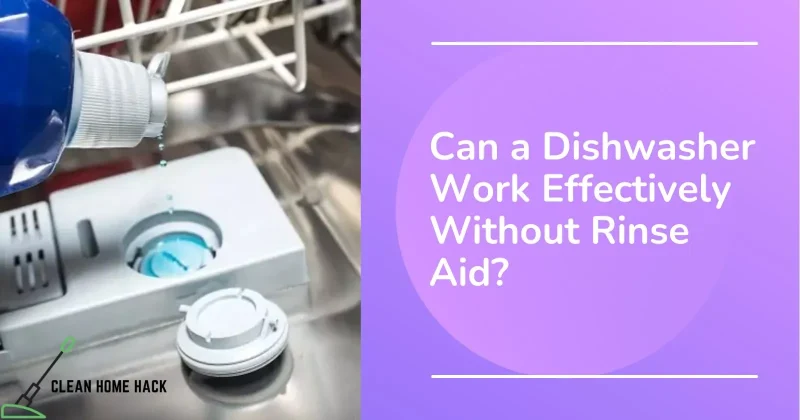Can a Dishwasher Work Effectively Without Rinse Aid?

 The Short Answer is: The Short Answer is: |
| Yes, a dishwasher can work without rinse aid, but it may not provide the same level of cleaning and drying performance as it would with rinse aid. Rinse aid is designed to enhance the drying process, reduce water spots and etching, and protect glassware from damage. Dishwasher detergents do not work the same way as they used to, and using rinse aid can significantly improve the performance of the dishwasher. |
Dishwashers are a convenient and time-saving appliance in any modern kitchen. However, many people wonder if they can skip using rinse aid and still get clean dishes.
Rinse aid is a liquid that is added to the dishwasher to help with the drying process and prevent water spots and streaks on dishes.
In this article, we will explore the question, “Can a Dishwasher Work Effectively Without Rinse Aid?” We will also discuss the benefits of using rinse aid and alternative methods to achieve spotless dishes.
Table of Contents
Understanding How Rinse Aid Works
Rinse aid is a drying agent that is dispensed during the final rinse of the dishwasher cycle to help water run off dishes and the interior of the unit, promoting better drying. It is also known as Jet Dry.
The primary purpose of rinse aid is to get rid of water spots, which can be particularly problematic if you have hard water.
Rinse aid helps remove water from flatware, plates, bowls, and glasses, and its hydrophobic properties prevent your dried dishes from showing water spots, which are caused by minerals left behind as water evaporates off.
Rinse aid can improve drying by reducing the surface tension of water. Instead of forming water droplets that cling and leave spots on your dishes, water “runs off” more effectively during the rinse cycle.
Rinse aid can be helpful even when using dishwasher detergent. The primary ingredient in rinse aid is a surfactant, which is also typically found in dishwasher detergents.
Surfactants help remove greasy food residue from dishes, suspend it in the wash water, and prevent it from re-depositing your dishes. It also helps the water to drain from these items during the wash cycle. Rinse aid needs to be refilled once every.
Rinse aid is a drying agent that helps remove water from dishes, prevents water spots, and improves drying performance.
It is dispensed during the final rinse of the dishwasher cycle and can be helpful even when using dishwasher detergent. The rinse aid needs to be refilled once every cycle.
Benefits of Using Rinse Aid in Your Dishwasher
Using a rinse aid in your dishwasher can provide several benefits. Here are some of the benefits of using rinse aid:
1. Dries dishes faster: Rinse aid helps to reduce the surface tension of water, which allows it to run off dishes more easily. This means that dishes will dry faster and more thoroughly, without any water spots or streaks.
2. Improves cleaning performance: Rinse aid can help to improve the cleaning performance of your dishwasher by preventing food particles and other debris from sticking to dishes. This means that dishes will come out cleaner and more hygienic.
2. Saves energy: By helping dishes to dry faster, rinse aid can help to save energy by reducing the amount of time that your dishwasher needs to run. This can also help to reduce your energy bills over time.
3. Extends the life of your dishwasher: Rinse aid can help to prevent mineral buildup in your dishwasher, which can cause damage over time. By using rinse aid regularly, you can help to extend the life of your dishwasher and keep it running smoothly.
To use a rinse aid in your dishwasher, simply add it to the designated compartment in your dishwasher according to the manufacturer’s instructions. Be sure to refill the compartment regularly to ensure that your dishwasher continues to work effectively.
When Can a Dishwasher Work Without Rinse Aid?
Rinse aid is an important component of a dishwasher’s cleaning process. It helps to speed up the drying process and reduce spotting on dishes. However, there are some instances when a dishwasher can work without rinse aid.
Here are some scenarios:
- If you use a high-quality detergent that already contains rinse aid, you may not need to add more. Some dishwasher detergents come with rinse aid built-in, so check the label to see if this is the case.
- If you have soft water, you may not need to use a rinse aid. Soft water doesn’t leave mineral deposits on dishes like hard water does, so you may not need the extra help from rinse aid.
- If you don’t mind a few water spots on your dishes, you can skip the rinse aid. While rinse aid helps to reduce spotting, it’s not essential for getting dishes clean.
It’s worth noting that while you can technically run a dishwasher without rinse aid, it’s not recommended. Rinse aid helps to protect your glassware from etching and can improve the overall quality of your dishwashing cycles.
If you’re unsure whether you need rinse aid or not, consult your dishwasher’s manual or speak to a professional for advice.
Factors That Impact Dishwasher Performance Without Rinse Aid
Factors That Impact Dishwasher Performance Without Rinse Aid:
1. Overloading the dishwasher: Overloading the dishwasher can impact its performance by preventing water and detergent from reaching all the dishes. This can result in dirty and poorly cleaned dishes.
2. Hard water: Hard water can leave mineral deposits on dishes, making them appear cloudy and spotty. Rinse aid can help combat this issue, but without it, hard water can impact the dishwasher’s performance.
3. Skipping the heat cycle: If you skip the heat cycle, your dishes may not dry properly, resulting in water spots and streaks. Rinse aid can help with drying, but without it, you may need to use the heat cycle to ensure your dishes dry properly.
4. Using too much detergent: Using too much detergent can cause suds to form, which can impact the dishwasher’s performance. It can also leave a residue on dishes, making them appear dirty.
5. Not using the rinse aid dispenser: If your dishwasher has a rinse aid dispenser, not using it can impact the dishwasher’s performance. Rinse aid can help with drying and prevent water spots and filming. It is recommended to use a colored rinse aid, such as blue so that you can more easily see the rinse aid level in the gauge.
Tips for Maintaining Dishwashing Quality Without Rinse Aid
Tips for Maintaining Dishwashing Quality Without Rinse Aid:
1. Scrape off food particles from dishes before loading them into the dishwasher. This will prevent food particles from clogging the dishwasher’s spray arm and ensure that the dishes are cleaned properly.
2. Use the right amount of detergent. Follow the product directions to determine the right amount of detergent, especially with concentrated varieties, which may require less product than you think.
3. Load the dishwasher properly. Be careful not to overload the dishwasher and run it on a full load.
4. Use white vinegar as a substitute for rinse aid. White vinegar with 5% acidity or less can be used as a suitable substitute for rinse aid, at least when it comes to water spots and better drying.
5. Use the hottest, longest cycle. If you use rinse aid properly, that is, put your dishwasher on the hottest, longest cycle, no residue will remain on your dishes.
6. Don’t bother pre-rinsing. Modern dishwashers have never been better at removing grime. Pre-rinsing is not necessary and can waste water.
By following these tips, you can maintain dishwashing quality without using rinse aid.
Frequently Asked Questions Related to the Topic:
Is it OK to run dishwasher without rinse aid?
It is technically okay to run a dishwasher without a rinse aid. Rinse aid is not essential for the dishwasher to work. However, using rinse aids can enhance the drying process and protect glassware from etching.
If you don’t use a rinse aid, your dishes will still dry utilizing the heat from the dishwasher’s dry cycle, but you might experience water spots from water lingering for too long on each dish.
The results of not using regular rinse aid in your dishwasher will likely not be catastrophic, but it can have a noticeable impact on the quality of your dishwashing cycles and the long-term appearance of your dishes.
Will dishwasher work without salt and rinse aid?
Yes, a dishwasher can work without salt and rinse aid, but it may not be as effective as when using it. Salt is used to soften hard water, which can lead to limescale build-up on utensils and damage the appliance.
Rinse aid, on the other hand, helps to get spotless results from the machine, enhances the drying process, and protects glassware from etching.
Without rinse aid, dishes may still dry, but they will have more spots, film, and left-behind markings. However, it is worth noting that rinse aid is not as important to use as cleaning tablets or salt.
What is a natural alternative to rinse aid in a dishwasher?
There are several natural alternatives to rinse aid in a dishwasher, including:
1. Vinegar: Undiluted distilled white vinegar can be used as a natural rinse aid. Use a small funnel or a steady hand to fill the automatic rinse agent dispenser with vinegar. Run the dishwasher as usual.
2. Citric acid: Citric acid is a biodegradable ingredient that can be used as a natural rinse aid. Mix 1/2 cup of citric acid with 1/2 cup of water and pour it into the rinse aid compartment of the dishwasher.
3. Essential oils: A few drops of essential oils can be added to vinegar or citric acid to give the rinse aid a pleasant scent.
4. Baking soda: Baking soda can be used as a natural rinse aid to help remove stains and odors from dishes. Add 1/2 cup of baking soda to the bottom of the dishwasher before running it.
Using natural alternatives to rinse aid in a dishwasher has several benefits, including being biodegradable, chemical-free, and cost-effective. These natural alternatives are just as effective as store-bought rinse aids, without the harmful side effects.
Conclusion on Can a Dishwasher Work Effectively Without Rinse Aid
In conclusion, using a rinse aid in a dishwasher is highly recommended as it enhances the drying process, reduces water spots and etching, and results in a beautiful sparkle for your dishes.
Dishwasher detergents don’t work the same as they used to, and a rinse aid is necessary to get spotless results from your machine. Although not catastrophic, not using regular rinse aid in your dishwasher can have a noticeable impact on the quality of your dishwashing cycles and the long-term appearance of your dishes.
Using vinegar in a cup is not as good as rinse aid and can be a bit of a pain. A new study shows that using a new-ish dishwasher is more efficient than traditional hand-washing techniques.
The dishwasher won’t stop working if you are using cold water for your dirty dishes, but hot water has a better cleaning ability than cold water.
Using rinse aids helps considerably in achieving drier items after the cycle, especially plastic items. If your dishwasher is not cleaning like it should, you may need to clean the machine or unclog the filter.







